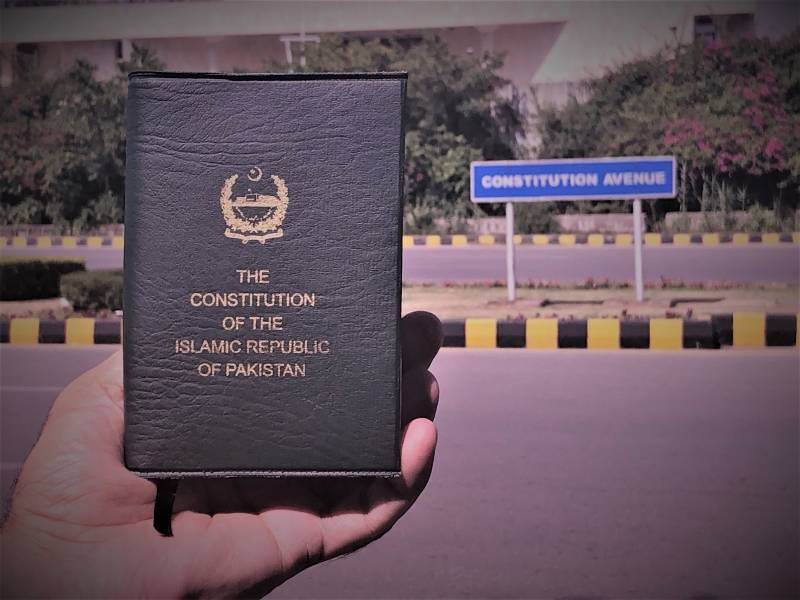
Pakistan's Constitution needs to behave as a living document that evolves with its people and the needs of the state while critically analysing its evolution over time.
This was discussed as the Human Rights Commission of Pakistan (HRCP) organised a conference on the national Constitution's role as a dynamic social contract between citizens and the state to mark 50 years of the 1973 Constitution.
During the conference, various sessions and plenaries were held, which discussed various aspects of the Constitution and its evolution were discussed.
In one session, Human Rights Commission of Pakistan (HRCP) 's Secretary-General Harris Khalique said that the 50th anniversary was an opportunity for the nation to take stock of the Constitution as a social contract between citizens and the state.
In this context, HRCP Chairperson Hina Jilani said that the Constitution could function as a living document only if the Parliament had the wisdom and foresight to ensure that it evolves with society and the state.
Critically examining Pakistan's constitutional history, HRCP Council Member Nasreen Azhar pointed out that the Objectives Resolution — as part of the Constitution — marginalised religious minorities.
Researcher and constitutional expert Zafarullah Khan suggested that the Constitution should be considered a 'user manual of statecraft'.
"It should be reviewed and reconciled with its original spirit and evolving polity, which includes incorporating international human rights law into the chapter on fundamental rights," he said.
Moderating the session, academic Dr Naazir Mahmood expressed that the Constitution needs to reflect the rights of the marginalised, such as children, the youth and specially-abled people.
While moderating a session on the relationship between the Constitution and federalism, journalist Asma Shirazi said that political governance experiments such as the 'hybrid-plus state' had weakened a critical building block of society: the political parties.
Former senator Afrasiab Khattak explained the contradiction that exists between the de jure and de facto state. He explained how 'majoritarian tyranny' had marginalised people living in the peripheries, such as Balochistan and the erstwhile federally administered tribal areas (FATA).
Public policy expert Abdullah Dayo observed that there is a need to evolve a second charter of democracy, which involves both the mainstream and smaller nationalist political parties, and to build trust between them and reiterate a commitment to federalism.
The third panel assessed whether the Constitution was protecting the rights of the vulnerable and marginalised.
Moderating the session, HRCP member Fatima Atif said that it was important to separate religion from the state.
Transgender rights activist Nayyab Ali pointed out how the Constitution spoke of protecting the right to dignity and equality but that it fell short when it did not expressly specify that these rights are applied to gender minorities.
Rehman Bajwa, the chief coordinator of the All Government Employees Grand Alliance (Pakistan), added that the Constitution does not expressly protect the rights of those engaged in informal labour.
Rights activist Ali Ahmad Jan pointed out that an important element missing from the Constitution was its recognition of territories such as Gilgit-Baltistan and of 'cultural minorities'. By not recognising them, he said that it compounds the vulnerability of these minorities and communities.
Researcher and gender rights activist Dr Saba Gul Khattak said the Constitution does not protect refugees' right to livelihood. At the same time, Islamabad Hindu Panchayat President Pritham Das Rathi criticised its failure to protect religious minorities from violence.
Tariq Ghori, an activist with the National Commission for Justice and Peace, reminded how, in his August 11 speech, Pakistan's founder Muhammad Ali Jinnah had stated that the rights of religious minorities should be included in the Constitution.
Journalist Munizae Jahangir questioned the restrictions on freedom of expression imposed under Article 19 of the Constitution in a session moderated by local government specialist Fauzia Yazdani.
Former National Assembly member Daniyal Aziz criticised the role of the judiciary in supporting constitutional transgressions and recommended that the Council of Common Interests should be strengthened by evolving consensus among all parties and relevant stakeholders.
Asif Khan, the chief executive of the Shaheed Bhutto Foundation, suggested that left-of-centre parties need to take the lead in strengthening constitutional protection of labour rights.
Former senator Farhatullah Babar concluded the session by pointing out that, while the May 9 riots should be condemned by all political parties, they should not be used as an excuse to cede space to undemocratic forces.

